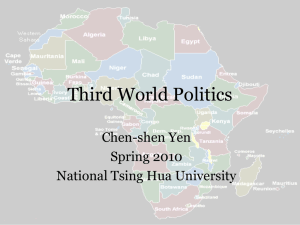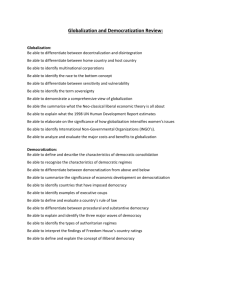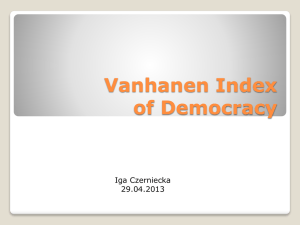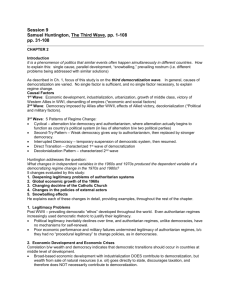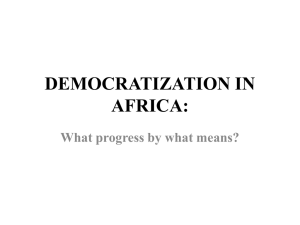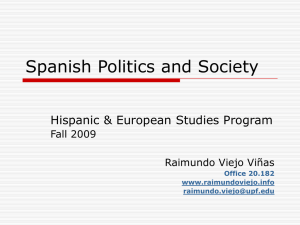Rule of law Temptations - American Bar Foundation
advertisement
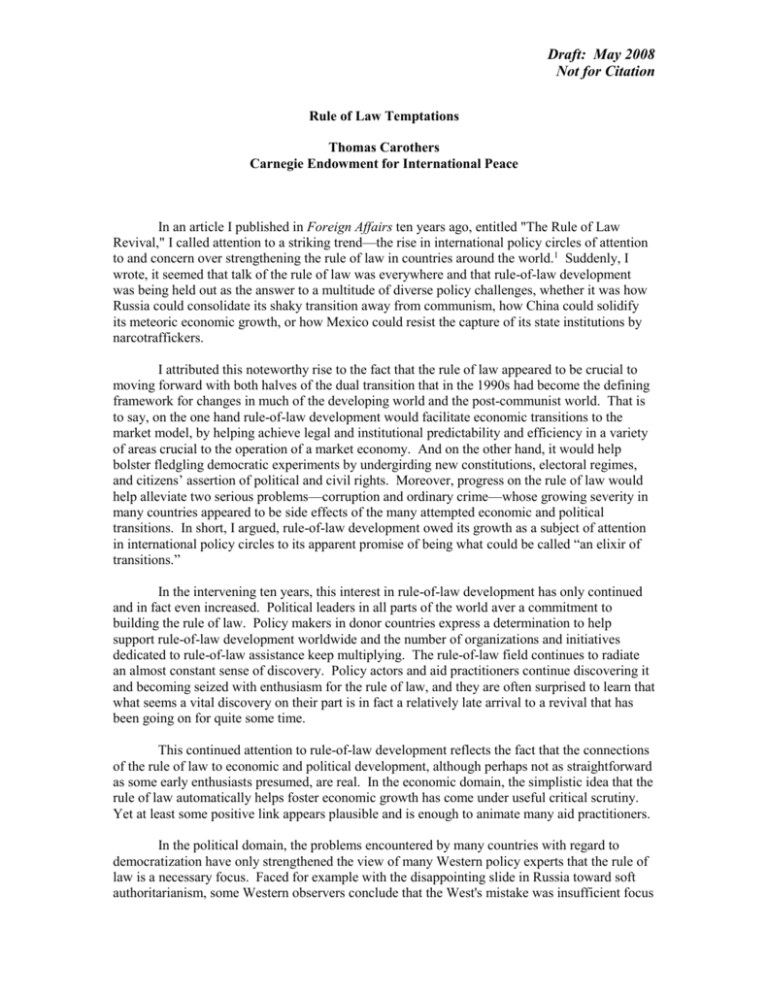
Draft: May 2008 Not for Citation Rule of Law Temptations Thomas Carothers Carnegie Endowment for International Peace In an article I published in Foreign Affairs ten years ago, entitled "The Rule of Law Revival," I called attention to a striking trend—the rise in international policy circles of attention to and concern over strengthening the rule of law in countries around the world.1 Suddenly, I wrote, it seemed that talk of the rule of law was everywhere and that rule-of-law development was being held out as the answer to a multitude of diverse policy challenges, whether it was how Russia could consolidate its shaky transition away from communism, how China could solidify its meteoric economic growth, or how Mexico could resist the capture of its state institutions by narcotraffickers. I attributed this noteworthy rise to the fact that the rule of law appeared to be crucial to moving forward with both halves of the dual transition that in the 1990s had become the defining framework for changes in much of the developing world and the post-communist world. That is to say, on the one hand rule-of-law development would facilitate economic transitions to the market model, by helping achieve legal and institutional predictability and efficiency in a variety of areas crucial to the operation of a market economy. And on the other hand, it would help bolster fledgling democratic experiments by undergirding new constitutions, electoral regimes, and citizens’ assertion of political and civil rights. Moreover, progress on the rule of law would help alleviate two serious problems—corruption and ordinary crime—whose growing severity in many countries appeared to be side effects of the many attempted economic and political transitions. In short, I argued, rule-of-law development owed its growth as a subject of attention in international policy circles to its apparent promise of being what could be called “an elixir of transitions.” In the intervening ten years, this interest in rule-of-law development has only continued and in fact even increased. Political leaders in all parts of the world aver a commitment to building the rule of law. Policy makers in donor countries express a determination to help support rule-of-law development worldwide and the number of organizations and initiatives dedicated to rule-of-law assistance keep multiplying. The rule-of-law field continues to radiate an almost constant sense of discovery. Policy actors and aid practitioners continue discovering it and becoming seized with enthusiasm for the rule of law, and they are often surprised to learn that what seems a vital discovery on their part is in fact a relatively late arrival to a revival that has been going on for quite some time. This continued attention to rule-of-law development reflects the fact that the connections of the rule of law to economic and political development, although perhaps not as straightforward as some early enthusiasts presumed, are real. In the economic domain, the simplistic idea that the rule of law automatically helps foster economic growth has come under useful critical scrutiny. Yet at least some positive link appears plausible and is enough to animate many aid practitioners. In the political domain, the problems encountered by many countries with regard to democratization have only strengthened the view of many Western policy experts that the rule of law is a necessary focus. Faced for example with the disappointing slide in Russia toward soft authoritarianism, some Western observers conclude that the West's mistake was insufficient focus on the rule of law early on after the collapse of the Soviet Union. The catastrophic problems in Iraq after the ouster of Saddam Hussein have prompted a similar conclusion on the part of some U.S. observers. When in Egypt the Muslim Brotherhood made a surprisingly strong showing in the 2005 parliamentary elections, some analysts cautioned that Egypt should not move ahead with a political opening until it first consolidates the rule of law. Moreover, the rule of law has also gained further impetus in this decade from the continued advance of globalization. Already by the late 1990s it was becoming clear that globalization tends to increase incentives and even pressures for rule-of-law development both within countries and among countries. Countries seeking a share of the increasing flow of capital and goods across borders find that weak rule of law can be an obstacle. And such flows create a need for new formal and informal approaches to regulating and managing such activities, which further creates a need for rule-of-law development. Although globalization has proven in this decade to be less benign and much less a process of spreading of Western norms than many U.S. observers believed or hoped it would be ten years ago, its continued intensification has bolstered the need for rule-of-law development in many countries. Almost every element of the current characteristic features of globalization— whether it is the outsourced service industries, the growth of commodity markets, or the troubling use by extremist groups of the Internet as a global communications aid—implies some sort of rule-of-law development as either a facilitator or a counterweight. In this context of ever-increasing interest and often enthusiasm for rule-of-law development among Western policymakers and aid practitioners, a tendency exists toward uncritical and sometimes wishful thinking about the idea itself. Some of these lines of thought represent what can be described as temptations, temptations to believe certain things about the rule of law and its place on the international stage that are misleading and possibly unhelpful. At least four such temptations—concerning consensus, reductionism, sequencing, and ease—are identifiable and deserve critical attention. Consensus The degree of apparent international consensus on the value and importance of the rule of law is striking. Almost all other parts of the Western donor consensus on what is good for other countries are sources of debate. For example, the desirability of the Washington consensus, or the neoliberal model as critics like to call it, is argued about constantly in policy and public circles in both developed and developing countries. Even liberal democracy, which appeared for a time to be gaining near universal normative acceptance, is questioned these days, whether by practitioners of "authoritarian capitalism," Bolivarian democracy, Islamic revolutionary democracy, or other alternative political systems. In contrast, almost no leader anywhere is openly against the rule of law and will publicly mount an argument that the rule of law is a bad idea for their society. This very wide consensus is impressive. Yet one must be careful about attributing too much significance to it. In the first place, affirmations by powerholders of commitment to advancing the rule of law often do not translate into real action. Many leaders in developing or post-communist countries are elected these days on the basis of promises to reduce corruption, restore law and order, and other elements of a rule of law agenda. Yet these stern promises tend to melt in the heat encountered when confronting entrenched, countervailing interests. As yet, however, relatively few citizens of countries in the former Soviet Union, South America, subSaharan Africa, South Asia, and elsewhere would say that the apparent global consensus on the 2 importance of the rule of law has translated into actual recent marked improvement of the state of law in their societies. Second, even to the extent stated commitments to the rule of law are real, the concept as used internationally is so capacious that it is open to significantly different interpretations and operational emphases. Actors at different points along the right-left ideological spectrum, for example, find in it specific diverse elements they care about. Thus for example persons on the conservative side often embrace the rule of law as a desirable developmental objective because they find in it things they especially value, such as property rights, fair treatment of foreign investors, strong police, and a general emphasis on law and order. Persons on the left read the concept differently. They see in it a focus on rights and on fair and equal treatment for all, a focus that will help boost disadvantaged people and empower citizens generally. Centrists are drawn to the rule of law as a technocratic ideal, one that encompasses key elements contributing to good governance, such as governmental accountability, transparency, and anticorruption. As a result, when diverse national and international actors gather and agree that they are all committed to helping build the rule of law in a particular country or context, they are usually agree on much less than it initially appears. They may all proceed with a putatively common rule-of-law agenda but in practice pursue quite different preoccupations, either in relative isolation from each other or sometimes at cross purposes. Third, whereas in the 1980s and 1990s the growing international interest in the rule of law was part and parcel of an expanding international consensus on democratic political values, in this decade that may no longer be true. The main challengers to the liberal democratic line— the "authoritarian capitalist" governments such as Russia and China (and various resource-rich states in Central Asia, the Middle East, and Africa) also profess a commitment to building the rule of law. Vladimir Putin came to office in Russia promising a rule-of-law presidency and he held to that line (at least rhetorically) even as he moved the country away from its earlier democratic experiment. China's rulers have been responding to rising citizen anger and unrest over corruption and poor local governance not with political liberalization but instead with ruleof-law reforms and a continued hard line on political contestation. In these and other countries, strong-hand rulers have found that the rule of law works well as an alternative objective to democratization, not one that complements it but rather that will help preserve authoritarian or semi-authoritarian rule. Thus in this decade, the continued growth of international attention to the rule of law is arguably as much about the fraying of an international consensus on political values as a convergence. Reductionism Historically, two schools of thought about the definition of the rule of law have competed for primacy.2 One school holds to more formalist, or procedural conceptions of the rule of law, focusing on fairness and efficiency in the formulation and implementation of laws. The other school seeks to give the rule of law a more substantive character. It critiques formalist definitions as describing rule by law rather than the rule of law. It holds that the rule of law is about substantive outcomes, not just procedural norms. Political and civil rights, in this view, are essential to ensuring a just society and should be considered an integral part of the rule of law. The substantive conception points to the view that the rule of law and liberal democracy are necessarily intertwined, that one cannot exist without the other. Both schools of thought could be found among aid practitioners when rule-of-law assistance expanded in the 1980s and 1990s. Those aid organizations that pursued rule-of-law 3 work out of an economic rationale tended to hew to more procedural conceptions, seeing fairness and efficiency as key elements of the rule of law helpful to economic development. Those aid groups that embraced rule-of-law work as part of a democracy promotion agenda gravitated to a more substantive conception. The general trend overall was towards broader, more inclusive definitions of the rule of law as part of the general spirit of the 1990s which saw the economic and political parts of the developmental agenda part of a new international consensus infused by the notion that "all good things go together." In this decade, however, that positive evolution has come into question as a tendency makes itself felt toward reductionism in approaching the rule of law—embracing selective, narrow definitions of the concept. As authoritarian and semi-authoritarian governments come forward adopting the rule-of-law mantra they pick and choose from the overall concept, selecting those limited elements that sound good to their publics and do not entail deeper political reform. Western policy actors, often eager to find signs of positive change or at least positive intent from those governments, salute these steps, overlooking the larger damage that such reductionism may cause to the health of the broader rule-of law-agenda. Sequencing Another unhelpful temptation concerning the rule of law that has gained ground in international policy circles in this decade is that of sequencing—the idea that transitional countries should not pursue rule-of-law development and democratization together but rather in sequence, first building the rule of law and only after that turning to democratization. The growing reach of this idea connects to the tendency toward reductionist thinking about the rule of law—seeing rule-of-law development and democratization as quite distinct processes rests on a narrow, proceduralist conception of the rule of law. The new enthusiasm for sequencing on the part of some influential Western scholars and policy experts reflects their concerns over what they see as the high risks involved when countries with weak states and little experience with political pluralism attempt rapid processes of democratization.3 Such risks include the emergence of illiberal democracies and the outbreak of civil or interstate conflict. Sequentialists believe that by first developing the rule of law, traditionally authoritarian societies will create the necessary mechanisms and habits of control and restraint to ensure that unpredictable processes of mass political participation do not get out of hand. They buttress their arguments in favor of sequentialism for transitional countries with the argument that this was the pattern followed in the 18th and 19th centuries by what are now the well-established democracies of Europe and North America. Sequentialism is appealing not only to scholars and policy experts concerned about economic and political transitions going awry. Authoritarian and semi-authoritarian power holders also readily embrace the idea. It gives them a principled justification for blocking or avoiding democratization. In the sequentialist paradigm, putting off democratization, via repression or other means, becomes the correct path toward eventual democratization. Sequentialism is indeed an appealing idea. It promises to bring order and rationality to what might otherwise be unpredictable, dangerous processes of sociopolitical change. Unfortunately, however, it is a flawed idea.4 It is true that a society needs a certain basic level of order and the existence of basic institutions of a state before it should attempt the establishment of political pluralism and active political contestation. Yet the idea that societies should live with authoritarianism until they develop full-fledged rule of law and a well-functioning state is mistaken. 4 The core flaw in this idea is the notion that authoritarian leaders, if properly pushed by the international community, will in fact take their societies along the road to the rule of law. The image of the austere, wise autocrat who slowly but systematically builds the rule of law may be attractive, but it is much more the exception than the rule. The developing world is crowded with countries that have suffered punishing abuses and developmental failures under authoritarian leaders who promised to advance the law and build the state as a foundation for eventual democratization. Only a few leaders have in fact delivered on such pledges, primarily in a small set of Asian countries that are exceptional in various ways. Although autocrats’ strong emphasis on order and control may seem a natural lead-in to rule-of-law development, in fact authoritarian leaders have strong structural reasons to abridge and avoid true rule-of-law development. They may like to use law as an instrument of state control. But cardinal features of the rule of law—establishing a truly independent judiciary, subordinating government officials to the law, treating all citizens in accordance with basic principles of legal fairness, and respecting political and civil rights—threaten the power and hold of authoritarians. The arc from gilded promise to open failure on rule-of-law development is all too familiar in the developing world. Fledgling democratic governments certainly struggle with rule-of-law development. New political elites getting into power for the first time often fall into corruption. Democratic governments may focus only on short-term survival rather than longer-term institutional reform. Popular pressures on such governments for anticrime measures may lead more to abridgments of rights rather than genuine rule of law reforms. Nevertheless, unlike autocratic governments, new democratic governments do not face any intrinsic or structural clash between the rule of law and their hold on power. Creating alternative centers of power, treating citizens evenhandedly, and respecting rights are all integral not just to building the rule of law but also to deepening democracy. Moreover, certain common elements of democracy actively help foster the rule of law. Alternation of power for example helps break up established concentrations of influence and control within state institutions, reducing corruption and increasing accountability. Freedom of the press, which rarely exists under authoritarianism but often under democracy, is a powerful mechanism for bringing attention to legal abuses by powerholders and helping build the rule of law. A related flaw in the sequentialist outlook is the notion that democratization can simply be put off for some extended time while the rule of law is achieved. This idea ignores the fact that over the last two decades the norm of democratic participation has spread widely in the world. When authoritarian governments lose their grip and collapse, such as Indonesia in the late 1990s, citizens usually push for elections, no matter how ill-prepared the country may be for democracy according to classic “preconditions analysis.” Some authoritarian governments are able to put off citizen pressures for greater participation through successful economic performance but they are more the exception than the rule. Finally, the idea that sequentialism is in fact the formula that produced successful, stable democracies in the West is at best an oversimplification and in fact largely myth. Take the United States as one example. The young United States did not first achieve a well-functioning rule of law and then gradually add democratization bit by bit on top of that foundation. The rule of law and democracy developed in a joined-up, complex process in which both moved ahead by fits and starts. During the 19th century, the United States fell short in significant ways in both the rule of law (frontier justice in the American West hardly represented a well-functioning rule of law) and in democratization (slavery being the most egregious but hardly the only violation of 5 democratic principles). It was only in the 20th century that both a relatively well-functioning rule of law as well as a relatively well-functioning democracy came to define the American national experience. Sheri Berman argues that the same pattern of complex interweaving of rule-of-law development and democratization also characterized Europe's path in the modern era.5 Ease As attention to the promotion of the rule of law has continued expanding in this decade, it has moved well beyond the circle of development and democracy specialists into the broader policy community. With this broadening reach has come an increase in references to rule-of-law building that imply that the task is relatively straightforward and even quick. Laments in Western policy circles about Russia's disappointing drift toward authoritarianism sometimes take the form of "We should have focused on helping them build the rule of law first" as though this would have been a relatively manageable task. Similar thoughts are sometimes heard about Iraq, Afghanistan, or Palestine, or other troubled places. The notion that helping another country foster the rule of law is a straightforward task cuts against the whole direction of learning that has been accumulating among practitioners in the past 20 years. It is rooted in the familiar tendency that existed within the aid community early on (back in the 1980s, and also before, in the 1960s) to see rule-of-law development as either a naturalistic process or a technocratic process that unfolds once the right injections of outside knowledge are administered. What Western policy makers and political observers are overlooking in their enthusiasm for the rule of law as a response to troubled transitions is that movement from a state of weak or absent rule of law to the achievement of the rule of law involves far more than getting judges trained, putting modern police equipment in place, and re-printing and distributing legal texts. It is a transformative process that changes how power is both exercised and distributed in a society and thus a process inherently threatening to existing powerholders. It also involves basic changes in how citizens relate to state authority and also to each other. Arguably, achieving the rule of law is a more complex and deep-reaching challenge than democratization. In its barebones forms, democratization is primarily a process of organized political contestation which can leave many other societal structures relatively intact whereas law cuts through almost every part of the political, economic, and social domains. Elites in many societies have demonstrated the ability to accommodate to democratization without either losing their privileged place in society or changing their ways very much. Yet they have often resisted or evaded key rule-of-law reforms, like subordinating power to law, as being too threatening. Conclusions The rule-of-law agenda on the international policy stage is of tremendous potential importance and value. It is precisely because of this fact, however, that it is subject to the various temptations described herein, including overestimation of the level of real consensus around the concept, reductionist thinking about meaning of the rule of law, the false promise of sequentialism, and underestimation of the difficulties involved. These temptations do not represent fatal threats or grave dangers to the agenda but rather wrong paths that can result in wasted efforts and bad policy decisions. These temptations are a result of a complicated mix of factors: 1) the sometimes overabundant enthusiasm of new proponents of the rule-of-law agenda; 2) the cynical use of the 6 agenda by political actors seeking its legitimating effect; 3) the erosion of an international normative consensus on democracy; and 4) the fissiparous tendencies of a field based around a concept that is so broad and inevitably in fact vague. Moving ahead it is essential to keep a sober eye on the uses of the rule-of-law theme, to ward off unrealistic expectations, overly simplistic formulas, and other similar traps, not to mention unhelpful outcomes or results. As with other parts of the world of international policy and assistance that seek to do good on many fronts at once, a healthy dose of analytic as well as practical restraint is likely to increase the longevity of key themes and priorities relating to the rule of law in the years ahead. Thomas Carothers is vice president for studies–international politics and governance at the Carnegie Endowment for International Peace. He is the author or editor of many books and articles on democracy promotion and rule-of-law assistance including, Promoting the Rule of Law Abroad: In Search of Knowledge (Carnegie, 2006). Notes 1 Thomas Carothers, “The Rule of Law Revival,” Foreign Affairs, March/April 1998, 95-106. For an overview of this debate see Rachel Kleinfeld, “Competing Definitions of the Rule of Law,” in Promoting the Rule of Law Abroad: In Search of Knowledge, Thomas Carothers, ed. (Washington, DC: Carnegie Endowment, 2006), 31-74. 2 3 See for example, Edward D. Mansfield and Jack Snyder, Electing to Fight: Why Emerging Democracies Go to War (Cambridge: MIT Press, 2005) and Fareed Zakaria, The Future of Freedom: Illiberal Democracy at Home and Abroad (New York: Norton, 2003). For a broader critique of sequencing, see Thomas Carothers, “The ‘Sequencing’ Fallacy,” Journal of Democracy, vol. 18, no. 1, January 2007, 12-27. For replies to this critique see, “The Debate on Sequencing,” Journal of Democracy, vol. 18, no. 3, July 2007, 5-22. 4 5 Sheri Berman, “Lessons from Europe,” Journal of Democracy, vol. 18, no. 1, January 2007, 28-41. 7

